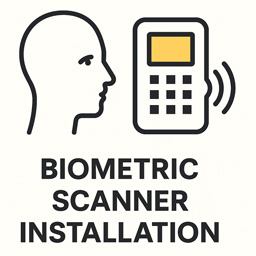Traditional keys are no longer enough to protect modern businesses. From offices and warehouses to healthcare and retail, organizations need secure and scalable ways to manage entry. This is where door access control systems come in. They provide advanced security, greater flexibility, and valuable data insights that physical keys simply cannot offer.
This guide explores the fundamentals of door access control, why businesses nationwide are adopting these systems, the technologies available, and best practices for implementation.
What Is Door Access Control?
Door access control is a system that manages and restricts entry into buildings, rooms, or secure areas. Instead of using physical keys, these systems rely on credentials like keycards, PIN codes, biometrics, or mobile apps.
Key functions include:
- Granting or denying entry based on permissions.
- Recording who entered and when.
- Integrating with CCTV, alarm, or IT systems for layered security.
Why Businesses Nationwide Are Moving Beyond Keys
- Security
Keys can be copied or lost. Access control systems eliminate these risks by using digital credentials that can be activated or revoked instantly. - Scalability
Businesses with multiple offices, warehouses, or retail locations benefit from unified, cloud-based access control systems. One dashboard manages access across all sites. - Accountability
Every entry and exit is logged. This creates an audit trail for compliance, safety, and investigations. - Cost Efficiency
Rekeying locks is expensive. Updating digital credentials is quick and affordable. - Integration
Modern systems connect with CCTV, alarms, and HR platforms, creating a single ecosystem for physical and digital security.
Types of Door Access Control Systems
1. Keycard and Fob Systems
- Employees use swipe cards or RFID fobs.
- Easy to manage and cost-effective.
- Common in offices, schools, and retail.
2. PIN and Keypad Systems
- Users enter a code at a keypad.
- Simple but less secure if codes are shared.
- Often used in small offices or restricted storage areas.
3. Biometric Systems
- Use fingerprints, facial recognition, or iris scans.
- High security, eliminates credential sharing.
- Increasingly common in healthcare, data centers, and government buildings.
4. Mobile and Cloud-Based Systems
- Access via smartphone app or Bluetooth/NFC.
- Centralized cloud management for multiple locations.
- Ideal for nationwide businesses with distributed sites.
Industries That Benefit Most
- Commercial Offices – Secure workspaces and manage visitor access.
- Warehouses & Logistics – Protect high-value inventory and track staff movement.
- Retail – Restrict stockroom entry and improve loss prevention.
- Healthcare – Comply with HIPAA and restrict access to sensitive areas.
- Data Centers – Safeguard servers and critical IT infrastructure.
- Hospitality – Provide secure, flexible guest and staff access.
Compliance and Safety Considerations
- Fire Safety
Systems must allow safe exit during emergencies. Integration with fire alarm systems is often required. - Data Protection
Personal information collected by biometric or cloud-based systems must comply with privacy regulations. - Industry Standards
ANSI, NFPA, and local building codes govern how systems are designed and installed. Working with a certified low voltage contractor ensures compliance.
Nationwide Trends in Access Control
- Shift to Cloud-Based Management: Centralized control for businesses with multiple sites.
- Mobile Credentials: Smartphones replacing traditional cards and fobs.
- AI-Powered Analytics: Systems that detect unusual patterns or flag security risks.
- Integration with IoT Devices: Linking access systems with smart building technology.
Best Practices for Implementing Door Access Control
- Assess Security Needs
Start with a site survey to identify entry points, risks, and compliance requirements. - Choose Scalable Systems
Select technology that grows with your business, especially if you operate nationwide. - Train Staff
Proper training ensures employees use the system correctly and safely. - Maintain and Test Regularly
Routine maintenance keeps systems reliable and prevents downtime. - Work with Certified Installers
Partnering with a nationwide low voltage service provider ensures proper design, installation, and support.
Benefits of Partnering with Nationwide Access Control Providers
Choosing the right access control partner is just as important as choosing the right technology. Businesses operating in multiple locations need a provider that delivers consistency, scalability, and reliable support. This is where Cablify stands out as a top-rated nationwide low voltage company.
Consistency Across All Business Locations
With Cablify, every site gets the same level of professional design, installation, and support. Whether you have offices in New York, warehouses in Texas, or retail stores in California, we ensure your access control systems are installed to the same high standards. This consistency improves reliability, reduces errors, and makes managing multiple sites much easier.
Centralized Support and Troubleshooting
Managing multiple vendors can lead to delays and confusion. Cablify offers centralized support nationwide, giving you one point of contact for service calls, upgrades, or troubleshooting. Our dedicated support team provides fast response times and remote assistance when possible, minimizing downtime and keeping your business secure.
Scalable Service Contracts That Fit Company Growth
Businesses evolve, and security systems must evolve with them. Cablify structures its service contracts to be flexible and scalable, ensuring your access control system grows as you expand. Whether you add a single office or multiple facilities across the country, we make scaling your security infrastructure seamless.
Compliance With Local and National Standards
Each state and city may have different building codes, fire regulations, and compliance requirements. Cablify’s nationwide experience ensures every installation meets both local and national standards. From NFPA life safety requirements to ADA accessibility compliance, our certified technicians design and install systems that keep you compliant and audit-ready.
Door access control goes far beyond keys and locks. For businesses nationwide, it provides stronger security, easier management, and the flexibility to adapt to future needs. Whether protecting offices, warehouses, or healthcare facilities, modern access control is an essential part of a comprehensive security strategy.
Investing in professional installation and support ensures your system is reliable, compliant, and ready to grow with your business.



